|
|||||||||
|
FEATURESGong Xiaogong and the Sacking of the Garden of Perfect Brightness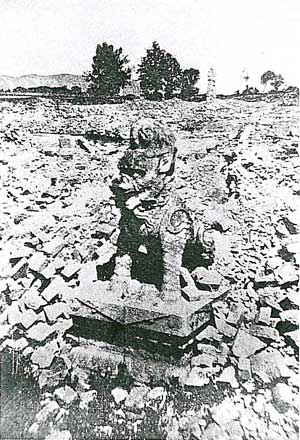 Fig. 1 A stone kirin or qilin, an auspicious mythological beast, in the rubble of the ancestral temple, 'Hongci Yonghu' (also known as Anyou Gong) at Yuanming Yuan. The temple was one of Qianlong's favourite spots in the gardens. Source: Huang Taopeng and Huang Zhongjuan, eds, Yuanming Yuan: Zhongguo lishishangde yidai mingyuan, Hong Kong: Sanlian Shudian Xianggang Fendian, 1985, p.81. Chinese scholars are almost universal in their condemnation of James Bruce, Lord Elgin, who led the Anglo-French Expeditionary Force to Beijing in 1860, as the man responsible for razing the Garden of Perfect Brightness. For Chinese patriots, the image of the isolated Jesuit-baroque stone rubble of the Western Pavilions at the garden remains the single most graphic image of 19th century conflict between China and the Western imperialist powers. Few today know of the diplomatic intricacies that led to the Second Opium War, or of the horrors, authored by both sides, attendant on its conclusion. In the mass of Chinese documentation on this deplorable act of international plunder, there is the occasional reference to 'traitors' who aided and abetted the Anglo-French Expeditionary Force in their wilful pyromania. 'Wild histories' (yeshi) and memoirs couched as fiction are even more specific, and single out one 'pseudo-foreigner clad in a white suit and boots' who purportedly led the foreigners to the palace complex in pursuit of a personal vendetta. Ironically, the father of 'the man in the white suit' is remembered in Chinese history texts as one of the most prominent patriots of the 19th century. 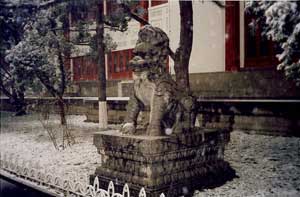 Fig. 2 The same kirin, repositioned to what is now Peking University in the early Republic. Photo: GRB, winter 2000. In the following investigation of this unsolved case we trace a path through a maze of whispers and innuendo. The story involves the poet Gu Taiqing, wife of Yihui, a man who was the son of the Daoguang emperor during whose reign Gong Xiaogong's father mysteriously died. Yihui had two famous half cousins: Yizhu (who reigned as the Xianfeng emperor) and Yixin (Prince Gong). The political fortunes of both of these men were enmeshed with the destruction of the Garden of Perfect Brightness. Prince Gong and his mansion (Gong wangfu) will be the subject of a future issue of China Heritage Quarterly. The following essay was first published as Gong Xiaogong: A Case of Mistaken Identity, Wellington: Asian Studies Institute, Victoria University, 1999. In Zhang Guangtian's 2006 play Yuanming Yuan (see 'On Stage & Screen' in Features), Gong Xiaogong continues to play an important, if invidious, role in the history of the garden palace, both past and present. [GRB] Gong Xiaogong: A Case of Mistaken IdentityDrifting in a sinful sea, Following the Anglo-French assault on the Yuanming Yuan, the Garden of Perfect Brightness, and a cheerless victory over the Chinese court in 1860, the British imperial representative Lord Elgin spent December in Shanghai recuperating from the frenzy in the north. He read Elizabeth Barrett Browning's Aurora Leigh, followed by Trollope's Doctor Thorne and Charles Darwin's recently published On the Origin of the Species. The latter perhaps would have given him son succour, for he may have found therein a justification for the retributive actions he had recently authored against the 'backward' and primitive Manchu-Chinese court. In 1861, Elgin was invited as Guest of Honour at the Royal Academy Diner and in his speech he commented on the devastation he and his fellows had wrought in Beijing:
Among other things he went on to speak of his view of Chinese art and aesthetics:
It has been suggested that one of the reasons why James Bruce, the Eighth Earl of Elgin, was concerned more with human life than with antiquities and buildings was that as a youth he had suffered from the obsession of his father (Thomas Bruce, a more infamous Lord Elgin) with the marble friezes of the Parthenon in Athens. His sensibility to human artifice was dulled by his earlier experience and brought to bear on his punitive expedition to north China. His decision to burn the Yuanming Yuan "at least meant that flesh-and-blood injuries done to people he knew intimately would for once be revenged not, as in war, upon other people...but on inanimate objects, on redundant and expensive things". And it was the Garden of Perfect Brightness that "would bear the brunt of his revenge".[3] It is here that there is an elision, perhaps, between speculation about Elgin's varied motives, hinted at in the above quotations, and rumours surrounding the presumed Chinese traitor who is said to have led the foreign forces to the Yuanming Yuan. The 'traitor' (Hanjian) is supposed to have suggested that rather than taking revenge on the Han Chinese city of Beijing, the Anglo-British forces exercise themselves on the garden-palaces beloved of the Manchus. Objects destroyed and looted as opposed to lives lost and suffering inflicted thus seem to offer a strange dimension of coincidence between the reasoning of James Bruce, Lord Elgin, son of the purloiner of the 'Elgin Marbles', and the putative Chinese instigator of the pillage of the Yuanming Yuan, Gong Cheng (Xiaogong), son of a famed critic of Qing rule. 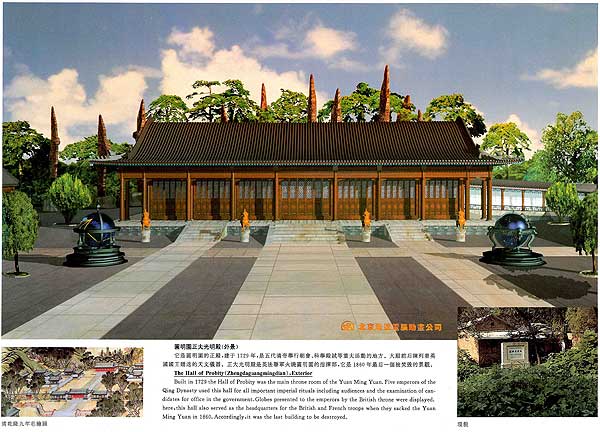 Fig. 3 A computer-generated view of the main audience hall, 'Zhengda Guangming', of Yuanming Yuan. It was here that Lord Elgin set up the headquarters from which he and his colleagues orchestrated the rape of the gardens. Therefore, it was probably the last building to be torched. Source: Beijing Zhuda diannao donghua gongsi. Gong ZizhenGong Xiaogong was the eldest son of Gong Zizhen (hao Ding'an, 1792-1841), a noted literary figure of the late Qing.[4] While his father's abiding fame has been enshrined by propagandists as an exemplar of the Qing scholar-officials whose crise de coeur, expressed in prose and poetry, have become staples of patriotic education, his son, when mentioned at all, is known as an unfilial eccentric and traitor. Gong Zizhen was an early and articulate critic of Qing governance. He is claimed by nationalist and Communist Party historians alike as 'China's Dante' and he figures prominently in the modern lineage of literati-patriots who were prescient enough to recognise the cause and needs of Han China as distinct fro abiding loyalty to the ruling house of the Qing, the Aisin Gioro. The reality, his loyalties and those of his son, however, may be quite different from contemporary interpolations. Gong Zizhen was from a famous literary family of Hangzhou. Having spent much of his youth in Beijing he soon became involved in scholarly pursuits and an (often frustrated) official career. Evidence of his insight into the looming plight of the Qing empire can be found in an essay produced in 1820 'Bar Foreign Ships from our Southeastern Coasts'.[5] Though no longer extant its title hints at an understanding of the possible friction with European traders decades before conflict broke out into the open. Gong became an associate of Lin Zexu, the Imperial Commissioner entrusted by the Court with the abolition of the opium trade, and with him and Wei Yuan formed a poetry club, the Poetry Society, in 1830. Stymied in his official career due to his poor calligraphy—and presumably because of the disquiet caused by his ideas—Gong Zizhen became increasingly critical of the authorities and outspoken about his views, thereby adding to his reputation as an unstable and erratic individual. He shared his insights with Lin Zexu and when the latter was commissioned by the court to deal with the opium trade in Guangzhou, Gong wrote to him about the inequitable situation and entreated his friend to limit commerce with the West while also building up China's defences. He even offered Lin his services, but was turned down.[6] Rebuffed, in both Beijing and Canton, Gong suddenly quit his post with the Board of Ceremonies, where he had been working since 1837, and left the capital, an act that confirmed his reputation for erratic behaviour, or 'wildness', kuang. 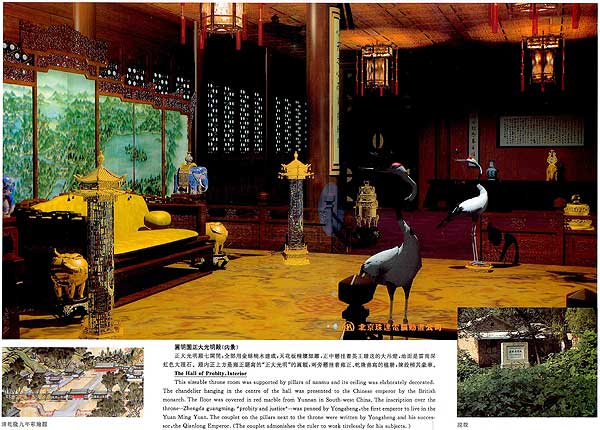 Fig. 4 A computer-generated impression of the interior of the imperial audience hall, 'Zhengda Guangming'. Source: Beijing Zhuda diannao donghua gongsi. If anything, Gong Zizhen's fame grew after his sudden departure and, by the end of the dynasty, he was regarded as a precursor of the intellectual foment that would eventually overwhelm the country. Even in the late Cultural Revolution (the early 1970s) he was one of the few writers whose complete works were made available.[7] Just as he was pressed into the service of Party orthodoxy then his name was also invoked by the authors of the controversial 1988 TV series River Elegy, who said of him:
Gong is remembered in particular for his 'Miscellaneous Poems of the Year Jihai'(Jihai zashi), a cycle of poems written in 1839, after he quit Beijing and returned south. The most famous of these is, perhaps:
These lines were later popularised within the Communist Party by no less a figure than Mao Zedong when, in 1945, in commenting on the need for Party members to be more innovative, he said famously, "I urge Marx and Lenin to shake us up again/ and grant us human talent not bound to a single kind".[10] More relevant to our present argument, however, are suggestions that the "human talent not bound to a single kind", of which Zizhen wrote, included in particular his son, Gong Xiaogong. Gong XiaogongThe eccentric scholar (kuangshi), or idiosyncratic individual has been a cultural stereotype in China, variously excoriated and celebrated, for centuries. The irreverent 'empty talkers' of the Wei-Jin period were blamed for the fall of dynasties; the unruly philosophers and writers of the late Ming, from Li Zhi to the Yuan brothers of Gongan, were vilified for rejecting the orthodoxy of the day and conspiring in the fall of the last Han imperial house. Outspoken and irascible individuals have been condemned either as the products of social and political decadence, the dangerous embodiment of decline, or as a cultural malaise, the prognosticators and progenitors of collapse whose very words and deeds add to the desuetude of dynasties. The details of Gong Xiaogong's life are sketchy. Born in Shanghai in 1817, he was educated in a family that had produced talented scholars and writers for a number of generations, both among its male and female members. As the son of a renowned writer, and great-grandson of a famous etymologist and phonologist, Duan Yucai, Xiaogong grew up in a scholastic environment with easy access to a large library of rare books, many of which, it was said, were not included in Qianlong's Great Treasury of the Four Compilations (Siku quanshu). His youthful talent was spoken of as excelling even that of his gifted father, with whom he travelled as he pursued his official career in Beijing. It was also a clan with recent affiliations and a fascination with the growing port city of Shanghai. But his was a genius confounded by a wildly arrogant personality. "His eccentricity put him at odds with the times and led him to even greater excesses. He is viewed universally as a misfit." Loathing the world in which he found himself, Xiaogong is portrayed as having eventually let his errant nature lead him to the heinous acts of a traitor, a Hanjian.[11] Although like his father a native of Hangzhou, Xiaogong is taken by writers and historians as being a typical deracinated Shanghai gadfly, a failed scholar and local dandy. One of the most important sources of information about Gong's life is tantalisingly brief biographical sketch by his friend, the scholar and 'displaced person' Wang Tao (1828-1897).[12] According to Wang, a drinking companion during Xiaogong's last years, Gong studied both Manchu and Mongolian during his father's long years in the imperial capital, spending much of his childhood disporting himself with non-Han companions and honing his skills in archery and horsemanship with them; so much so that Wang claimed that "he was altogether a young barbarian [hu'er]". It was in his youth that he also became friendly with Yang Molin, a man who ran some seventy pawnshops and was known as Pawner Yang. Accustomed to the privileges of wealth and painfully aware of his father's frustrated official career, Xiaogong took little interest in pursuing the traditional path of the scholar-official, although his father admonished him in a series of four poems to persevere with his studies and not to waste his efforts on vain-glorious fame.[13] 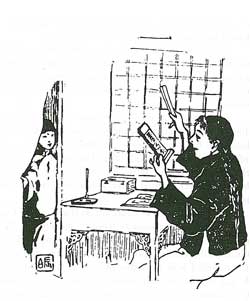 Fig. 5 'From inside the room I heard a tapping noise...' [When asked why he was hitting his father's funerary tablet, Gong responds:] 'My father was a great man who gained his great name under false pretenses... his admirers... would even praise the perfume of his farts. I am trying at the moment to arrange his collected works for publication, but there are a number of things that are utter rubbish, or confusing and misleading at the very least.... He always used to correct my writing, and whenever he found a mistake he would beat me. Not it's my turn...' Source (image and text): Renditions Special Issue: Middlebrow Fiction, Nos. 17&18 (Spring & Autumn 1982), p.162. In keeping with the image of the indulgent eccentric, Xiaogong is spoken of as being a "disciple of Liu Ling", that is, a heavy drinker. Although drunken fits could explain much of his behaviour, the popular stories about his arrogance were also taken by many as pointing at one fatal flaw, that of filial impiety. So sure of his own literary taste, Xiaogong presumed to sit in judgement on the works of his own father. According to biographical notes and rumour, Xiaogong would set up his father's ancestral tablet on his desk and as he read through his work would strike it with a teacher's rule as a sign of his displeasure whenever he came across what he deemed to be infelicitous phrases or weak lines of poetry. Said to be a man of few words who would flee large gatherings of people by his middle years Xiaogong supposedly felt himself to be a failure. While resident in Shanghai where he became known as one of the "wild eccentrics" of the city (haishang yikuang)—he was even know for years as "Crazy Man Gong" (Gong fengzi)[14]—Xiaogong is said to have made the acquaintance of Zeng Jipu, a Cantonese, and through him met Thomas Wade, the British consul general, for whom he became a secretary and something of an interpreter. When the Anglo-French Expeditionary Force was sent to Tianjin and then on to Beijing in 1860, Xiaogong reportedly accompanied it, resulting in a reputation of infamy that was to haunt his last years and besmirch his name thereafter.[15] The 'Traitor'The name of Gong Xiaogong has been obscured by obloquy from the time of the sacking of the Yuanming Yuan, for the story goes that he acted as the guide to the foreign forces that attacked the imperial precinct in the late summer of 1860. According to some, he actually led the invaders to the garden-palace outside Beijing itself and suggested that rather than exacting revenge on the capital, an act that would inevitably have resulted in a great loss of life, they instead loot and burn the magnificent Manchu pleasance on its outskirts. The odium attached to this supposed act of treachery, first given currency by a rumour and then hinted at by no less an authority than Wang Tao, has been reinforced by popular anecdotes, by an influential series of poems on the Yuanming Yuan by Wang Kaiyun (1833-1916), written some years after the pillage, and in fictional accounts published early in the twentieth century (for Wang Kaiyun's poem, see Articles in this issue). More recently, this strange tale has resurfaced once more in the form of a new novel about the despoliation of the gardens. One of the most detailed descriptions of Xiaogong's involvement with the history of the Yuanming Yuan, published in the Republican period, actually finds the first textual evidence of treachery among Chinese turncoats like Gong in the Veritable Records of Wenzong, the account of the Xianfeng reign. The writer Xie Xingyao quotes from an imperial memorial dating from mid-1860 to the effect that:
The traitors, some of them wastrels and vagabonds from Guangdong, others local bandits from around Beijing, supposedly included in their number Gong Xiaogong. Returning to Wang Tao's contemporary version of the events, we learn that he gleaned the details of them during long bouts of drinking with Xiaogong. "Mr Kung [Gong]", Wang remarks, "was by nature very fond of wine, and as he was one of my very best friends, whenever I was free in the evening I would go to his place and stay there until the small hours drinking and talking about everything under the sun". The telling passage in Wang Tao's account reads:
The rumours about Gong dressed in Western garb—some have him leading the foreign troops to the Yuanming Yuan wearing a white linen suit and gold rimmed spectacles—and at the beck and call of the British were current in the last years of his life. They were reinforced by Wang Tao's comments—and perhaps by Gong's own drunkern bragging—and soon embellished by the wags of Shanghai. His reputation as an increasingly unstable character supposedly led to a falling out not only with his British employer, but also with his fellow. Again, as Wang Tao remarks:
Poverty forced Xiaogong to sell his scant possessions, though he kept his two concubines, having eschewed the company of his wife for over a decade. And even his sons repulsed him and he drove them away when they attempted to visit from Hangzhou. As Wang concludes, "Naturally all this aroused a good deal of hostile talk. He went out of his mind before he died".[19] One is led to surmise that this "hostile talk" gradually found expression in a form both more malicious and permanent than the haughty scorn with which Xiaogong had treated his contemporaries. I would speculate that the malice was embroidered into the stories that grew around accounts of his role in the punitive Anglo-French expedition to Beijing in 1860. Many writers on the subject of the sacking of the Yuanming Yuan speak of the currency of tales about Xiaogong acting as a guide to the foreign troops and that he even went so far as to suggest that they destroy all of the Haidian gardens (Dianyuan), as the numerous imperial and noble residences and villas in the Haidian area northwest of the walled city of Beijing were collectively called at the time. Sources are often referred to in tantalisingly vague terms in an attempt to add a cloak of veracity to the rumours about Gong. There is little doubt that there was a general sense of local outrage at the conduct of the southern Chinese who had followed the foreign forces to the capital and had enthusiastically engaged in the plunder. Furthermore, there is evidence both in foreign eyewitnesses' accounts and in writings of local writers (and imperial records) that these camp followers found scant fellowship with the northerners whose city they were attacking, and that they had even less sympathy with the Manchu rulers whose pleasure palace they helped sack. Nor should it be forgotten that the disdain that Beijing people, in particular residents in and around Haidian, showed for the outsiders might also be in part due to their own role in the destruction of the Yuanming Yuan—for there are claims that it was Haidian residents who first clambered over the palace walls to loot the place and then set it on fire to disguise their felony before the outsiders arrived. 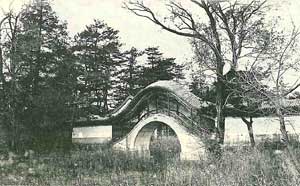 Fig. 6 A rare image of Guiyueqiao, a bridge at the site 'Pangran Dagong' near the Buddha city of Sravasti, Yuanming Yuan, that survived the sacking of the gardens. There is speculation that the picture was taken surreptitiously by a foreigner as the grounds of the gardens were still interdicted imperial property long after 1860. Source: Liu Yang, Xiride xiagong: Yuanming Yuan, Beijing: Xueyuan Chubanshe, 2005, p.75. Others see the rape of the Yuanming Yuan and Gong's putative involvement in it in a somewhat more sympathetic light. The argument is made that Gong Xiaogong may have indeed directed the foreign troops to the Yuanming Yuan, but by so doing he was instrumental in protecting both the imperial palace at the heart of Beijing and the city itself, the Celestial Capital, and symbolic centre of the Manchu-Qing dynasty. For although they resulted in inestimable material loss, the plundering of the treasures of the Yuanming Yuan and the razing of the garden pavilions did fortuitously contribute to the salvation of the city and its inhabitants. As Chai Xiaofeng, writing in the 1930s, remarks:
More phlegmatic historical opinion, however, makes the case that there is no substance to the rumours regarding Gong's notorious deed; nor, apart from aberrant emotional need, is there any reason to support the various rationalisations of Xiaogong's supposed infamy. Having reviewed both Chinese and non-Chinese sources regarding the destruction of the gardens, the historian Liu Fenghan, writing in Taiwan in the early 1960s, concluded that:
Sins of the SonGiven such doubts, it is not surprising—and perhaps even fitting—that it is in the realm of fiction that Gong Xiaogong's posthumous ill repute has continued to grow, the story of his treason being embellished with increasingly colourful detail with the passage of time. The modern formulation of Gong's historical reputation has entailed a complex calibration of issues related to statist Confucian values, loyalty to the Manchu-Qing dynasty and the nascent sense of 'patriotism' that emerged as that dynasty foundered. The most famous late-imperial example of Xiaogong's fictional career is embodied in the character of Gong Xiaoqi, a distasteful figure who features in the opening chapters of the episodic novel A Flower in a Sinful Sea. Inspired by 'A Freedom Lover' (Ai Ziyouzhe, the penname of Jing Songcen [1874-1947]) and written by 'The Sick Man of Asia (Dongya bingfu), that is, Zeng Pu (1872-1935), A Flower in a Sinful Sea made its debut in instalments in 1903. In the second chapter of the novel we find a description of an encounter between a number of scholar-officials in a Shanghai teahouse. While chatting they catch sight of a surly Chinese figure in Western dress jabbering away in English with a foreigner. They subsequently learn that this man is none other than the infamous Gong Xiaoqi, a man famed for having led foreign troops to destroy the Yuanming Yuan:
Gong's character and history had been established some time earlier in the novel:
Later on, Gong's concubine, 'Forest of Love' (Ailin), is interviewed by one of the protagonists of the book, and she describes her erstwhile lover's peculiar character (here the author borrows heavily from Wang Tao's account of Xiaogong):
Having fallen out with Wade, however, Xiaoqi was reduced to trading in antiques and curios. His rejection of accepted social mores led him, claims the concubine, to take— 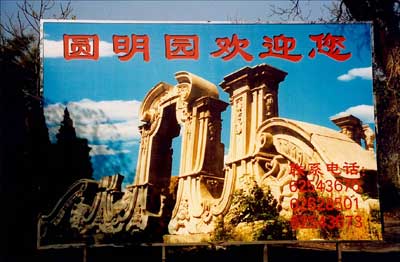 Fig. 7 'Yuanming Yuan Welcomes You!', northeast entrance to the gardens, 1998. Photo: GRB.
People generally believed he had gone over to the foreigners for money an offered advice to the Elgin mission:
And it is this point in the narration of A Flower in a Sinful Sea that the fiction about Gong Xiaogong is conflated with another intriguing and romantic tale about his father, Gong Zizhen, and the supposed clandestine love affair between Zizhen and the poet Gu Taiqing.[26] The Lilac AffairThere had been speculation about Gong Zizhen's last years from the time of his sudden death in 1841. As we noted earlier, in 1839 he quit his position with the Board of Ceremonies and travelled alone to his native town of Hangzhou. He later returned to the capital to accompany his family back south, but notably failed to enter Beijing itself. Of the various speculations about his sudden demise in Danyang, Jiangsu, in 1841 where he was teaching,[27] the most convincing is tale about a close relationship he is said to have had with Gu Taiqing. Gu Taiqing (also known as Xilin Chun, 1799-?1875) was a noted writer of verse, a painter and connoisseur of art. She became the concubine of Yihui (1799-1838), a grandson of the Qianlong emperor and a noted poet and calligrapher who inherited the rank of prince in 1815. Her life with Yihui was a happy one, but following his death she was expelled from the princely mansion by Zaijun, Yihui's son from an earlier union, along with her seven children. According to one source, this precipitate act was due to gossip in the capital concerning a reputed affair she was said to have had with Gong Zizhen.[28] She lived on into the 1870s, producing a collection of poetry generally remarked upon as being among the finest of the late Qing. The rumours about Gu Taiging's affair with Gong Zizhen are based on one of the most famous quatrains in Gong's 'Miscellaneous Poems of the Year Jihai' that reads: Lingering on a desolate mountain, tired with travel, 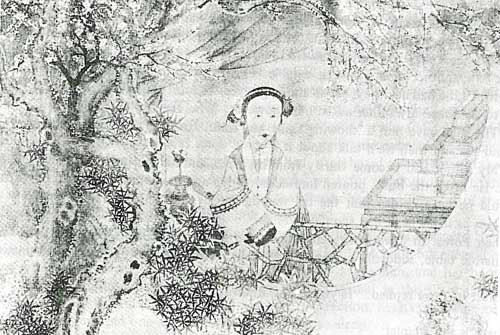 Fig. 8 Gu Taiqing, on whom the character Purity in the novel A Flower in a Sinful Sea is based. Source: Renditions Special Issue: Middlebrow Fiction, p.162. This is followed with an annotation by Gong to the effect that the poem was written, 'In remembrance of the lilacs at Taiping Lake inside Xuanwu Gate'. The mere mention of 'lilacs at Taiping' in this elliptical note sparked what was soon called the 'Lilac Case' (Dingxianghua gongan), and for decades there was speculation about a covert love affair between the disaffected Qing official and the Manchu noblewoman. Gu Taiging herself had written of a lilac in one of her poems; and the 'vermilion mansion' (zhudi), of her husband, Yihui (later the house of Yihuan, Prince Chun, and the birthplace of Zaitian, the Guangxu emperor), was indeed near Taiping Lake inside Xuanwu Gate. Subsequent research has discredited these fanciful accounts of a relationship between the two.[30] However, this story of love frustrated was soon woven into the fabric of myth and speculation about both father and son. The famous twentieth-century essayist and novelist Lin Yutang included the story when introducing Gong Zizhen in his 1961 English anthology of 'Chinese wisdom', The Importance of Understanding, thereby giving the tale an international currency.[31] Lin used the anecdote as an introduction to an excerpt from an essay by Gong Zizhen, 'On Partiality', in which Gong says:
In A Flower in a Sinful Sea the 'lilac affair', a story based on scant lines of poetry and a fertile literary imagination, is further embellished so that Gong Zizhen and Gu Taiging become tragic lovers. In the novel Gong and the concubine of Prince Mingshan, 'Purity and Spring of the Western Forest' (Taiqing Xilin Chun)—that is, Gu Taiging—become smitten after a chance encounter. There follows a detailed description of the ruse subsequently used by Purity to have Gong drugged and brought secretly to her bedchamber. Thereafter, at their second meeting,
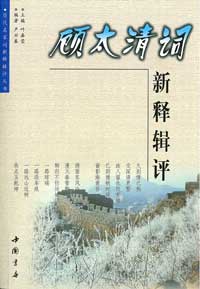 Fig. 9 Cover of a volume of Gu Taiqing's ci poetry. Lu Xingji, ed., Gu Taiqing ci xinshi jiping, Beijing: Zhongguo Shudian, 2005. All too soon the affair is discovered and Purity entreats her lover to flee the capital at once and to guard against a plot by her enraged husband to have him poisoned. Having travelled to Danyang without misadventure, Gong lets down his guard. Inveigled by a former colleague from the Office of the Imperial Clan to go out gambling, he soon falls sick and, realising all too late that he has been poisoned, he dies but not before entreating his son to avenge this murder most foul. The only person his son ever reveals this story to is his own concubine, Forest of Love, who relates the son's secret confession in the following words:
The novel A Flower in a Sinful Sea was a perfect vehicle for these sentiments, which were at one and the same time both anti-Manchu and anti-imperialist. Gong Xiaogong's personality and history also fit in neatly with Zeng Pu's authorial motives in discussing thwarted Han aspirations and the quirky personalities of nineteenth-century Shanghai. 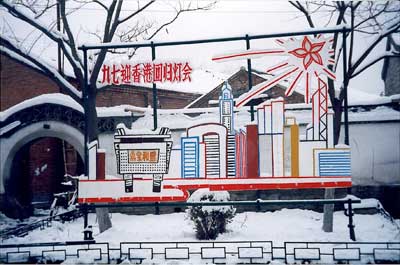 Fig. 10 A lamp festival propaganda installation at Yuanming Yuan to celebrate the 1997 reassertion of Chinese suzerainty over Hong Kong, winter 2000. The bronze simulacra of the ding, or cauldron, in the foreground that bears the words 'Precious Cauldron Filled with Harmony' (sheng/cheng he bao ding) was presented by patriotic Hong Kong people to the Yuanming Yuan and can be found at 'View of Distant Seas', Western Pavilions. Photo: GRB. A Prototype Pseudo Foreign DevilDespite these fanciful descriptions and the odium surrounding Gong's name there are also a number of elements in the story of this 'Chinese traitor' that provide grounds for some speculation of our own. In the first place, in Gong Xiaogong do we not find the prototype of the 'pseudo foreign devil' (jiayangguizi), a kind of figure who appears in fiction and historical accounts throughout the twentieth century? Or is this testy individual no more than a man to be placed in a tradition of the unsuccessful scion of a literary family turned to dilettantism and dissolution? While he was undoubtedly a product of a traditional education and imbued with the attitudes of the scholar-bureaucrat, in many ways Gong Xiaogong was also very much representative of the port personality, or the Shanghai style that was a feature of works like Zeng Pu's A Flower in a Sinful Sea. As depicted in this novel, he was abrasive in his dealings with fellow Chinese yet comfortable in the foreign world; desirous of revenge against a culture and political system that he perceived as having failed him; and resentful of the way his father had been treated. Coupled in the popular mind with Wang Tao's description of him, Gong Xiaogong appears to have had the following characteristics:
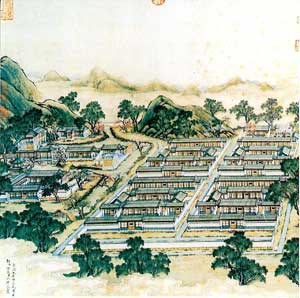 Fig. 11 'Dongtian Shenchu' (Deep inside the cave-heaven), one of the 'forty scenes' of Yuanming Yuan in the Qianlong era. Located inside the eastern Fuyuanmen Gate of Yuanming Yuan it was not far from the imperial audience hall. During the mid-Qianlong era this complex contained the Ruyi Guan studios used by the Jesuit artist/architects who were serving at the court. Source: Painting on silk from Yuanming Yuan sishijing tuyong, Beijing: Yuanming Yuan, 1991. The final irony in the story about Gong Zizhen, Gu Taiging and Gong Xiaogong's revenge on the Manchus is suggested by the historian Qian Mu. In explaining Gong Zizhen's sudden decision to leave Beijing in 1839, Qian refers to an interpretation offered to him by Zhang Ertian (1884-?), who suggested that Gong quit the capital because of "his belligerent stand on the opium issue and the consequent antagonism between Gong and the Manchurian Chief Grand Councilor Muzhanga".[35] The Grand Councilor was the champion of a policy of compromise with the British and, after the first Opium War in 1840, had successfully plotted the dismissal of Gong's friend, that leading opponent of the opium trade, Lin Zexu. 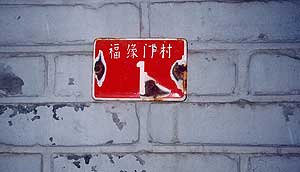 Fig. 12 House number at Fuyuanmen Village, previously the site of the Fuyuanmen Gate entrance to Yuanming Yuan, leading to the Ruyi Guan studios. Whereas this area had housed the mid-Qianlong era Jesuit artists/architects, for a few years in the early 1990s it became a centre for alternative modern Chinese art and was jokingly referred to as the 'West Village' of Beijing. The artist Fang Lijun, among others, had a studio there at the start of his rise to international fame. Photo: GRB Thus, information that would seem to solve the mystery about Gong Xiaogong's lust for revenge—the theory that his father left Beijing not because his affair with Gu Taiging had been discovered, but because he had offended the Grant Councilor Muzhanga—actually reopens for our consideration Xiaogong's possible motives for his presumed anti-Manchu act. For if his father had indeed fled into self-imposed exile under pressure from the anti-war party at court, and died prematurely as a result, Gong Xiaogong may have been nursing a grievance and waiting for the chance to exact revenge not simply on Yihui, Gu Taiqing's husband, but also on the Manchus—on the Grand Council and the Imperial Court itself. What better way to do this than to serve as an adviser to the British forces and propose the destruction of the garden-palace so beloved of the emperor? Manchu Decadence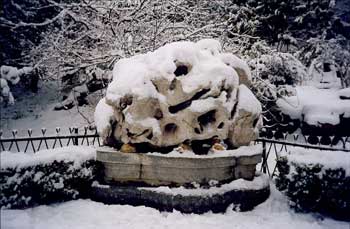 Fig. 13 A taihu stone from the Yuanming Yuan that was much admired by the Qianlong emperor. In the early Republican period, it was removed to the newly created Central Park (later Zhongshan Park) located on the site of the former Earth and Grain Altar (Shejitan) immediately to the west of Tiananmen Gate. Photo: GRB, winter 2000. The Manchus were initially viewed as hardy and stern rulers. This image, however, changed as the Manchus gradually took on the defining characteristics of imperial decadence. Originally, the Western traders had regarded the Manchus as a virile warrior caste, Spartan even, who conquered the effete Han Chinese of the Ming and introduced a reign of social order and good government throughout the empire. That opinion was gradually transmogrified as it came to be felt that the Manchus had been Sinicised by the Han, infected by their corruption and sexual dissipation, something supposedly encouraged by a court full of eunuchs, concubines and catamites. Their socio-political rule was eventually seen as being one that was profligate with the resources of the empire and that sapped the vital strength of its subjects; moreover, they were now regarded as possessing a cultural vision that was mired in the obfuscations of a backward-looking Confucianism The Manchus were themselves 'orientalised' and seen as duplicating in their later rule the decadence of the last Ming emperors. Lao She, perhaps the most famous twentieth-century Manchu novelist, depicted in his often humorous tales of old Beijing life the plangent fate of the Manchu Bannermen, nobles stripped of their wealth by imperial decline, war and personal decadence. Despite their fall from grace, many Bannermen retained the tastes of dandies and enjoyed to the end the diversions and entertainments of the ancient imperial capital. As Lao She observed in his famous family epic, Four Generations Under One Roof:
The Manchus had thus become the decadents, and the enlightened, revenant Han the natural allies of the West. Gong Xiaogong was such a figure: a traitor in the short term, a hanjian (literally, 'a traitor to the Han'), but a patriot in the larger scheme of things, a manjian (perhaps, a 'traitor to the Manchus'). His image in China, however, shifted over the years in accordance with the patriotic sentiments of Han nationalists. Despite attempts by some writers and historians to clear his name, his reputation remains sullied, his role became controversial and he was nearly universally excoriated. One example of this more recent treatment of him can be found in a novel published in early 1998 entitled Shock Awakening at Yuanming Yuan.[37] 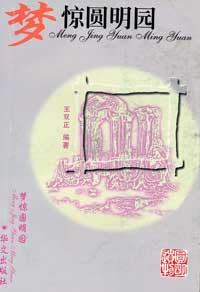 Fig. 14 Cover of Wang Shuangzheng's novel, Shock Awakening at Yuanming Yuan (Mengjing Yuanming Yuan), Beijing: Huawen Chubanshe, 1998. Written by a functionary at the Yuanming Yuan Ruins Park in Beijing, Shock Awakening is the story of the Anglo-French invasion, the dissolute carryings-on of the Manchu Court (in particular the Xianfeng Emperor, Aisin Gioro Yizhu) and the eventual plunder of the Yuanming Yuan. One of the dramatic characters whose personality and activities hold the story together is Gong Banlun, a traitor from Hangzhou. Banlun is a man who, having failed at the imperial examinations and being frustrated in love, decides to risk all in the service of the aggressive foreigners. Anxious to see the Manchus ousted from power, he hopes perhaps even to claim the Dragon Throne for himself.[38] In the novel the true identity of his role model, Gong Xiaogong, son of Gong Zizhen, is completely disguised—this is not a literati work of social criticism of the calibre of Zeng Pu's A Flower in a Sinful Sea. Wang Shuangzheng, the author of Shock Awakening, describes his loathsome protagonist (and there is never any doubt that he is just that) on the eve of the pillage of the Yuanming Yuan with the kind of disdain that mainland writers reserve for the politically unacceptable: 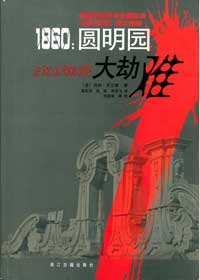 Fig. 15 Cover of the Chinese translation of Bernard Brizay's Le Sac du Palais d'été, Paris: éditions du Rocher, 2003; Bona.Bulisai, 1860: Yuanming Yuan dajienan, trans. Gao Faming, Li Quan and Li Hongfei, Hangzhou: Zhejiang Guji Chubanshe, 2005.
Having gained the confidence of the British invaders, Gong joins the officers for a brandy while lecturing them on how best they can utilise the ancient wisdom of Sunzi's Art of War to foil Chinese resistance. Gong Banlun's every move is that of the conniving pro-foreign traitor commonly depicted in communist literary and cinematic tradition. With the aid of corrupt toadies within the Yuanming Yuan itself, Gong plots with the invaders to destroy the palaces and through this one act obtain the wealth, fame and power denied to him by his fellow countrymen. 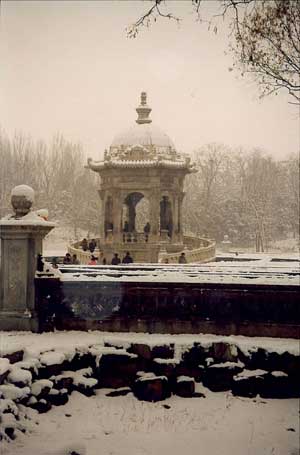 Fig. 16 The reconstructed Jesuit-designed maze (Wanhuazhen) at the Western Pavilions, winter 2000. Photo: GRB. As Banlun leads the assault on the gardens he encounters an old nemesis, Ren Liang, a guardian of the Yuanming Yuan. He is a friend of the Lei Family architects who have served the imperial house for generations (see Articles in this issue). That connection may be a concoction, but Ren Liang was an historical figure, a member of the imperial guard who died protecting the gardens and whose tombstone is on display in the Yuanming Yuan Ruins Park today.[40] Their exchange neatly sums up both Gong's treachery and the loyal Chinese Ren's defence of the palace:
This melodramatic dialogue allows the author to adopt the contemporary, politically acceptable line on the decadent late-Qing Manchu rulers, and to give voice to the disenchantment of Han Chinese (represented by Gong Banlun, even though his action in going over to the Western powers is anathema, a traitorous act), while also affirming the cultural value of the Yuanming Yuan as the product of Han Chinese greatness, a creation unsullied by the Manchu canker. Although Ren Liang dies in valiant defence of the garden compound, Banlun does not enjoy the fruits of victory for long. He is soon killed by an imperial concubine called 'Peony Spring' (Mudan chun) who has fled the ravished Garden of Perfect Brightness. A friend of the Lei Family, as well as of the martyred Ren Liang, she ensnares Banlun and executes him with his own pistol.[42] It is a nice twist, since unofficial histories of the Xianfeng reign (1851-1861) claim that the ruler neglected the affairs of state because he was besotted by four Han beauties, the eponymous 'Four Springs', of whom Peony Spring was one. According to this view, these Han women so distracted the Manchu emperor that he shunned his duties at court to pursue the sensual delights of these beauties in the secluded grounds of the Yuanming Yuan far from the interference of censorious officials in the capital. Indeed, even in court records there are accounts of Xianfeng angrily rejecting suggestions that he spend less time at the garden-palace.[43] In a quirk of both history and fiction, Peony Spring is thus contrived as having brought low the Manchu emperor, and the Han traitor who destroyed the emperor's beloved demesne. A Literary Tradition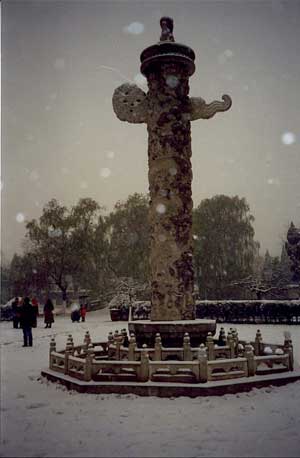 Fig. 17 One of a pair of marblehuabiao from the ancestral temple ('Hongci Yonghu', also known as Anyou Gong) in Yuanming Yuan. The huabiao were relocated to what is now Peking University in the early Republic. Photo: GRB, winter 2000. The relish with which the Gong Xiaogong mythology was launched and embellished is certainly evidence of the kind of literati self-loathing that came increasingly to the fore during the late Qing dynasty. A Schadenfreude resulting from self-hate and abnegation is the basic tenor of the first chapters of A Flower in a Sinful Sea, one that bewailed the fate of the nation while delighting in the decrepitude of the dynastic house. Lord Elgin had been an opponent of the style of gunboat diplomacy that was eventually to characterise his career in China. It is not without a measure of irony that one recalls his comments three years prior to the pillage in Beijing. In December 1857, from the deck of a gunboat, Elgin had recorded his sense of shame that the allied squadron was about to bombard Canton. "He was sad at the thought of earning for himself 'a place in the litany, immediately after plague, pestilence and famine'".[44] Gong Xiaogong may well have been innocent of the infamy ascribed to him; yet it was an infamy that through his Shanghai friend Wang Tao he evidently cultivated. But to what end? Was he but one more of the prickly individuals who have defied tradition and encouraged wild rumours and outrageous stories to enhance their colourful reputation? Or did he really act through Thomas Wade to encourage the allied forces to lay waste to the grand imperial palace-garden as an act of revenge on the Manchus for the supposed murder of his father? While the historical record will, it would seem, remain unclear about the exact nature of his actions and their motivation, there is no doubt that in literati jottings and popular fiction the odium surrounding Gong Xiaogong's name has tended only to wax, rather than wane, with the passage of time. And in the besuited, English-speaking and haughty persona of Gong Xiaogong we have the archetype of the twentieth century 'pseudo foreign devil', the readily despise traitor to both the state and the race. Shortly after Gong Zizhen's death in 1841, Xiaogong delivered his father's extant manuscripts to Wei Yuan in Yangzhou. An associate of Gong Zizhen's for some time and a like-minded critic of Qing governance, Wei edited a posthumous collection of his old friend's works. The introduction he penned in memory of his recently deceased colleague concluded with the words, "He had two sons. The elder of these, Cheng [Gong Xiaogong], carries on the literary tradition of the family".[45] Wei Yuan could have hardly guessed that Xiaogong would end his life in ignominy with neither an official title nor substantial published work to his name. It was to be in another, entirely unexpected form that he would eventually, enhance the literary fame of his clan. 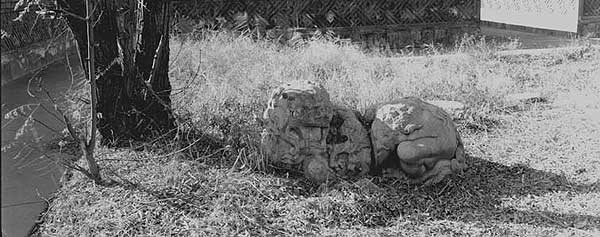 Fig. 18 The remains of a recumbent stone lion just north of the maze at the Western Pavilions. Photo: Lois Conner, winter 1999. Notes[1] Zeng Pu, Niehai hua, opening poem from chapter 1, translated by Rafe de Crespigny and Liu Ts'un-yan, Renditions, Special Issue: Middlebrow Fiction, (Nos 17&18) (Spring & Autumn 1982), p.153 (I have converted the romanisation of names to pinyin). For the original, see Zeng Pu, Niehai hua, Shanghai: Shanghai Guji Chubanshe, 1980, p.11.[2] Quoted in Jack Beeching, The Chinese Opium Wars, London: Hutchinson & Co., 1975, pp.329-30. [3] Beeching, op.cit., p.325. [4] ming Gongxiang, zi Changpao, later zi Yiaogong, and Shuala, also known as Banlun. In this essay I have chosen to refer to him as Gong Xiaogong, in keeping with common Chinese practice. He is most often referred to as Gong Cheng (Kung Ch'êng) in English materials. [5] Gong Zizhen, 'Dongnan ba Fanbo yi'. See Arthur W Hummel, Eminent Chinese of the Ching Period (1644-1912), Washington: United States Printing Office, 1943 (Reprint, Taipei: Ch'eng Wen Publishing Company, 1970, p.432). It has been suggested that due to the unpopularity of this view, Gong Xiaogong suppressed this essay after his father's death. See Shirleen S. Wong, Kung Tzu-chen, Boston: Twayne Publishers, 1975, p.151, no.32. [6] For details see, for example, Hummel, op.cit. [7] See Gong Zizhen, Gong Zizhen quanji, Shanghai: Shanghai Renmin Chubanshe, 1975. [8] From 'River Elegy', 'Lingguang', p. 54, quoted in G. Barmé and L. Jaivin, New Ghosts, Old Dreams: Chinese Rebel Voices, New York: Times Books, 1992, p.137. [9] From Stephen Owen, ed. and transl., An Anthology of Chinese Literature: Beginnings to 1911, New York: W W Norton & Company, 1996, p.1147. Mao Zedong popularised this poem by quoting it a number of times in the 1940s and 50s. See Wu Jiangxiong, ed., Mao Zedong tan gu lun jin (Mao Zedong talks about past and present), Hefei: Anhui Renmin Chubanshe, 1998, vol.1, pp.450-55. [10] From his concluding remarks at the Second National Congress of the Chinese Communist Party. Mao subsequently quoted Gong's poem on a number of occasions for various ends. See Wu Jiangxiong, ibid. The line 'thousands of horses all struck dumb' was also used against Mao in the mid-1970s to describe the atmosphere of terror during the Cultural Revolution. [11] Xie Xingyao, 'Gong Xiaogong yu Yuanming Yuan' (Gong Xiaogong and the Yuanming Yuan), Ziyue congkan, vol. 1, reprinted in Shu Mu, Shen Wei and He Naixian, eds, Yuanming Yuan ziliao ji (A collection of materials about the Yuanming Yuan), Beijing: Shumu Wenxian Chubanshe, 1984, p.287. [12] See H. McAleavy, Wang T'ao (1828-?1890), The Life and Writings of a Displaced Person, London: The China Society, 1953. A short biographical note can also be found in Tan Tingxian, 'Gong Gongxiang zhuan', see Liu Yisheng and Zhou Xifu, eds, Gong Zizhen biannian shi zhu, Hangzhou: Zhejiang guji chubanshe, 1995, p.775. [13] Poems 301-304 in 'Jihai zashi', see Liu and Zhou, op.cit., pp.775-78. [14] Yu Xingmin, Shanghai, 1862 nian, Shanghai: Shanghai Renmin Chubanshe, 1991, p.407. [15] These details are from Wang Tao, Songbin suohua, juan 5, la, b & 2a, in Biji xiaoshuo daguan, vol.17 (originally vol.35), Yangzhou: Jiangsu Guangling Guji Keyinshe, 1984, p.39. [16] Xie, op.cit., p. 290; and, 10th Year of Xianfeng, 8th Month (shang), Yichou Day, Wenzong Xian huangdi shilu, juan 327, in Qing shilu, Beijing: Zhonghua Shuju Chubanshe, vol. 44, p.863. [17] McAleavy, op.cit., pp. 9-10. [18] McAleavy, op.cit., p. 10. [19] zu yi fa kuang ji si, ibid. [20] Xie, op.cit., p. 295. [21] Liu Fenghan, Yuanmingyuan xingwangshi, Hong Kong: Wenyi Shuwu, 1969, p. 121. [22] Tseng P'u [Zeng Pu], 'A Flower in a Sinful Sea', ibid. [23] Tseng P'u, op.cit., p. 149; and Zeng, op.cit., p.8. [24] Tseng P'u, op.cit., p. 161; and Zeng, op.cit., p.19. [25] Ibid. [26] These biographical details are from the entries for I-hui and Ku-t'ai-ch'ing in Hummel, op.cit., pp.386-7. [27] For these other accounts, see Wong, op.cit., p.34. [28] See William H. Nienhauser, Jr., et al, eds, The Indiana Companion to Traditional Chinese Literature, Bloomington: Indiana University Press, 1986, p.492. [29] For the translation of this poem, no.209 in the Jihai cycle, see Wong, op.cit. For the original, see Liu Yisheng and Zhou Xifu, op.cit., p.697. [30] See, in particular, Meng Sen Xinshi congkan, Shanghai, 1936, III, 416-42a, quoted in Liu and Zhou, op.cit., pp.698-99. [31] Lin Yutang, The Importance of Understanding, London: Heinemann, 1961, p.441. [32] Op.cit., pp.442-3; and Gong, 'Lun si', op.cit., p.92. [33] Tseng P'u, op.cit., p.166; and Zeng, op.cit., p.23. [34] Tseng P'u, ibid; and Zeng, op.cit., p.24. [35] See Qian Mu, Zhongguo jin sanbainian xueshu shi, Taipei, 1957, p.552, referred to in Wong, op.cit., p.35. Wong outlines other possible explanations of why Gong Zizhen quit the capital in 1839 on pp.35-6. [36] Lao She, Huanghuo (from the cycle Sishi tongtang), translated in Pamela Kyle Crossley, Orphan Warriors, Three Manchu Generations and the End of the Qing World, Princeton, New Jersey: Princeton University Press, 1990, p.85. [37] Wang Shuangzheng, Mengjing Yuanmingyuan, Beijing: Huawen chubanshe, 1998. [38] Wang, op.cit., p.103. [39] Wang, op.cit., p.364. [40] See 'Yuanmingyuan weishi Ren Liang mubei' (Tombstone of Ren Liang, Guard of the Yuanming Yuan), in Zhang Baozhang and Yan Kuan, Jingxi mingmu, Beijing: Yanshan Chubanshe, 1996, p.55. The tombstone was uncovered on the site of the Blue Banner Battalion Village (Lanqiying tun), now in the grounds of Tsinghua University, in 1983. [41] Op.cit., p.380. [42] Op.cit., p.437. Peony Spring was the name of a real concubine, although it was her serving girl who was sent back to the gardens to gather personal belongings along with three others who all died in the foreign onslaught. They are known as the 'Four Palace Maidens' (si gongnü). [43] See Mao Haijian, Kumingtianzi: Xianfeng huangdi Yizhu, Shanghai: Shanghai Renmin Chubanshe, 1995, pp.143-46. [44] See Gerald S. Graham, The China Station, War and Diplomacy 1830-1860, Oxford: Clarendon Press, 1978, p.404, n.83. [45] Wei Yuan (1976) 'Ding'an wenlu xu', in Wei Yuan ji, Beijing: Zhonghua Shuju, vol.1, p. 239. |